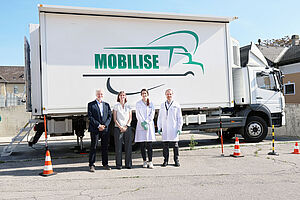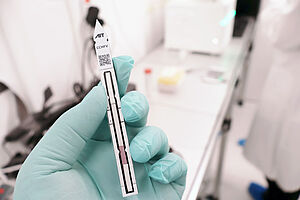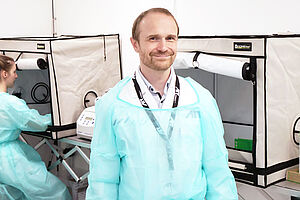On 6 May 2025, the EU project MOBILISE unveiled a new mobile high-containment laboratory (BSL-3) in the form of a nine-metre, solar-powered truck at the AGES site in Mödling. As a key partner, AIT is making essential contributions: its Center for Health and Bioresources provides novel point-of-care diagnostic systems, while its Center for Digital Safety and Security supplies a real-time data platform for decision-makers.
Global travel patterns and climate change are promoting the emergence and spread of novel infectious diseases. Conventional laboratories—particularly in remote regions—often face logistical and infrastructural challenges that delay diagnostics and thus cost precious time in the fight against outbreaks.
Point-of-Care Diagnostics
The AIT Competence Unit Molecular Diagnostics has developed miniaturized, automated molecular diagnostic systems that can be deployed directly in the mobile laboratory. Based on isothermal amplification methods, viruses such as West Nile virus or Crimean-Congo haemorrhagic fever virus can be detected within minutes. By combining AIT’s rapid tests with on-site PCR analyses, long transport routes are eliminated, laboratory capacities are relieved, and clinical decisions can be made in the shortest possible time. “Our point-of-care solutions dramatically shorten the time to diagnosis and enable immediate, targeted therapeutic intervention,” emphasizes Dr Johannes Peham, Senior Scientist in the Competence Unit Molecular Diagnostics at AIT’s Center for Health and Bioresources.
Automated Data and Decision Platform
In parallel with diagnostics, the mobile laboratory collects raw data and transmits it encrypted to a cloud-based platform of AIT’s Center for Digital Safety and Security. There, results are automatically processed, visualized, and correlated with historical outbreak data and epidemiological models. Through an interactive dashboard, authorities and first responders receive real-time situational overviews, risk assessments, and recommended courses of action—everything within minutes of sample analysis.
The prototype will undergo extensive field testing by national authorities and first responders in Austria, Germany, and Greece, followed by deployment in East Africa. The long-term goal is to establish MOBILISE as a blueprint for global One Health responses and thereby strengthen pandemic and epidemic preparedness worldwide.
Learn more about MOBILISE: https://mobilise-lab.eu/





